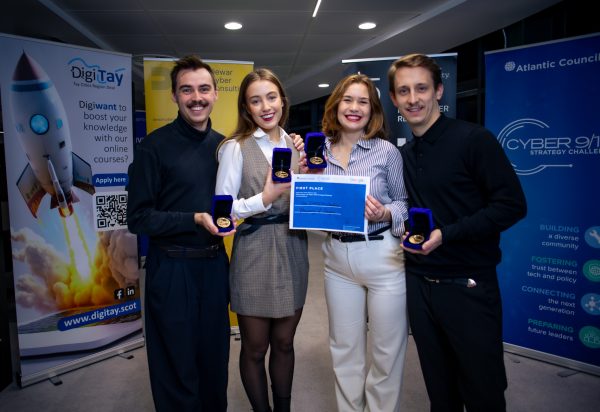Students across Scotland have taken part in a mock cyberattack scenario to test crisis management and response capabilities.
The simulated exercise was hosted at Abertay University’s cyberQuarter in Dundee as university and college students from around the country participated in a global competition.
It was the second time the Cyber 9/12 Strategy Challenge – organised by US foreign policy think tank the Atlantic Council – has been hosted in Scotland.
Entering its twelfth year, the Cyber 9/12 Strategy Challenge is a ‘one-of-a-kind cyber competition designed to provide students from across academic disciplines with a deeper understanding of the policy and strategy challenges associated with management of trade-offs during a cyber crisis’.
Part interactive learning experience and part competitive scenario exercise, it challenges students to respond to a realistic, evolving scenario, analyse threats to national, international, and private-sector interests, and provide recommendations on the best course of action to mitigate the crisis.
Since its establishment in Washington, DC in 2012, the competition has expanded its reach globally, with regional competitions across the US, as well as in London, Dundee, Geneva, Paris, Santo Domingo, Tashkent, and Cape Town.
The Dundee challenge was coordinated by Dewar Cyber Consulting and staff from Abertay University on 16 and 17 November, with 15 student teams taking part from Abertay, University of Glasgow, University of the West of Scotland, Dundee & Angus College and Fife College.
Senior cybersecurity professionals from Google, the Scottish Government, ScotlandIS, Cyber and Fraud Centre Scotland, Beyond Blue, Safe Digital Futures and Lead Scotland were among the judging panels charged with assessing the students’ performance.
Graeme Dey MSP, Scottish minister for higher and further education, attended day one of the challenge to address students and industry guests.
He said: “This competition is an important opportunity for students from Scotland’s colleges and universities to learn new skills and gain understanding of the challenges of responding to a major cyber incident.
“We know that demand for cyber security skills is high both in Scotland and globally. Competitions like this can help inspire people to think about future careers in cyber security and help to keep our businesses and public organisations safe in years to come.
“Our £6 million funding of the Abertay cyberQuarter through the Tay Cities Region Deal is offering opportunities for industry and academic collaboration to develop innovative cyber security solutions as well as supporting economic growth through job creation in the Scottish cyber industry.”
Safa Shahwan Edwards, deputy director of the Atlantic Council’s Cyber Statecraft Initiative, said: “The Atlantic Council is thrilled to return to Scotland for the second edition of the Cyber 9/12 Strategy Challenge, designed especially for students enrolled in Scottish colleges and universities. The competition’s healthy turnout from both students and practitioners highlights the importance of interdisciplinary skillsets for a career in cyber security. We appreciate our partnership with Dewar Cyber Consulting, Abertay University’s cyberQuarter and Scottish Government to bring this hands-on learning opportunity to students and for making this competition a reality.”
Rob Dewar, director and founder of Dewar Cyber Consulting, said: “It’s really pleasing to see the Cyber 9/12 Strategy Challenge return for a second year and to have so many young people from Scotland’s college and universities engaging with the exercise. Giving students a taste of the tough demands that a cyber incident can place on an organisation, its staff and its stakeholders is a great way to spark interest in the cybersecurity industry and I’ve been hugely impressed with how this year’s participants have risen to the challenge.
Abertay cyberQuarter is a centre for R&D, innovation and economic growth for the cybersecurity industry and is funded by the UK (£5.7m) and Scottish (£6m) governments through the Tay Cities Region Deal, providing a base for industry to mix with academia, creating new solutions to global cybersecurity challenges.
Prof Lynne Coventry, director of Abertay cyberQuarter, said: “This type of collaborative working between industry and academia is at the heart of what Abertay cyberQuarter was designed to achieve and the fresh perspectives and lateral thinking brought forward by the students has brought the competition to life and inspired our judging panel.
“It’s important for Scotland that we keep finding new and innovative ways to promote cybersecurity and develop new approaches for the sector, both in terms of creating job opportunities in the industry itself and also making the country more cyber-resilient.”
The event was sponsored by DigiTay, the Tay Cities Digital Skills Project which is part of the £20 million Regional Skills and Employability Development Programme, funded by the Scottish Government through the Tay Cities Region Deal.
Source: Futurescot

